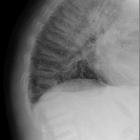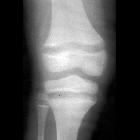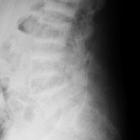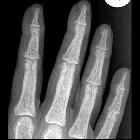Tertiary hyperparathyroidism























Hyperparathyroidism is the effect of excess parathyroid hormone in the body. It can be primary, secondary, or tertiary. There are many characteristic imaging features, predominantly involving the skeletal system.
Clinical presentation
Hyperparathyroidism is supported biochemically by either an elevated serum parathyroid hormone level or an inappropriately normal level in the setting of hypercalcemia.
Epidemiology
Associations
Hyperparathyroidism can occur in the context of the following conditions from parathyroid hyperplasia or less commonly multiple parathyroid adenomas :
- multiple endocrine neoplasia type I (MEN1)
- multiple endocrine neoplasia type IIa (MEN2a)
- familial hypocalciuric hypercalcemia
- familial isolated primary hyperparathyroidism
- hyperparathyroidism-jaw tumor syndrome
Pathology
Increased levels of the parathyroid hormone lead to increased osteoclastic activity. The resultant bone resorption produces cortical thinning (subperiosteal resorption) and osteopenia.
Subtypes
- primary hyperparathyroidism
- parathyroid adenoma (~80%)
- multiple parathyroid adenomas (4%)
- parathyroid hyperplasia (10-15%)
- parathyroid carcinoma (1-5%)
- parathyroid adenoma (~80%)
- secondary hyperparathyroidism
- caused by chronic hypocalcemia with renal osteodystrophy being the most common cause (others include malnutrition, vitamin D deficiency)
- results in parathyroid hyperplasia
- tertiary hyperparathyroidism
- autonomous parathyroid adenoma caused by the chronic overstimulation of hyperplastic glands in renal insufficiency
Radiographic features
- subperiosteal bone resorption
- classically affects the radial aspects of the proximal and middle phalanges of the 2 and 3fingers
- medial aspect of tibia, femur, humerus
- lamina dura: floating teeth (not specific)
- subchondral resorption
- subligamentous resorption
- ischial tuberosity
- trochanters
- inferior surface of calcaneus and clavicle
- intracortical resorption: cigar/oval-shaped or tunnel-shaped radiolucency in the cortex
- terminal tuft erosion (acro-osteolysis)
- rugger jersey spine
- osteopenia
- brown tumors
- salt and pepper sign in the skull (pepper pot skull)
- chondrocalcinosis
Findings in secondary (and tertiary) hyperparathyroidism are often associated with the osteosclerosis of renal osteodystrophy and the osteomalacia of vitamin D deficiency:
- subperiosteal bone resorption
- osteopenia
- osteosclerosis, e.g. rugger jersey spine
- soft tissue calcification
- superscan: generalized increased uptake on Tc-99m pertechnetate bone scan (focal uptake with adenoma)
- superior and inferior rib notching
Siehe auch:
- Weichteilverkalkungen
- Renale Osteodystrophie
- Rugger-Jersey-Wirbelsäule
- Akroosteolyse
- Osteomalazie
- Nebenschilddrüsenadenom
- multiple endokrine Neoplasie Typ 1
- subperiostale Knochenresorption
- MEN IIa
- chronische Niereninsuffizienz
- Ostitis fibrosa cystica
- Engel-von-Recklinghausen-Syndrom
- Leitlinie Primärer Hyperparathyreoidismus
- skeletal manifestations of primary hyperparathyroidism
- tertiärer Hyperparathyreoidismus
- selective blood sampling hyperparathyroidism
- superior and inferior rib notching
und weiter:
- Rippenusuren
- Basalganglienverkalkungen
- Gicht
- Pfeffer-und-Salz-Schädel
- Basiläre Impression
- Verkalkungen der Blase
- Rachitis
- Bulbus-oculi-Verkalkungen
- Superscan Szintigraphie
- primärer Hyperparathyreoidismus
- medulläre Nephrokalzinose
- Riesenzelltumor
- tumoröse Kalzinose
- osteitis pubis
- Sakroiliitis
- vegetable and plant inspired signs
- Chondrokalzinose
- Achillessehnenruptur
- calcaneal tuberosity avulsion fracture
- Markschwammniere
- differential diagnosis of calcified pulmonary densities
- Osteolyse der distalen Klavikula
- Riesenzelltumor des Knochens
- Gefäßverkalkungen
- Kalziumpyrophosphat-Ablagerungskrankheit
- chondrocalcinosis (mnemonic)
- Hyperostosis Kalotte
- central giant cell granuloma
- basilar invagination (mnemonic)
- renale Osteodystrophie Schädelkalotte
- lytic bone lesion (mnemonic)
- Osteoklastom
- multiple benign lucent bone lesions (mnemonic)
- ACJ erosion
- dens erosion
- Osteoporosis circumscripta
- Parathormon
- echogenic renal pyramids
- metastatic calcification in the brain
- acro-osteolysis (mnemonic)
- distal clavicular erosion
- Iliosakralgelenksarthrose
- ISG-Sklerose
- Metaphysäre Chondrodysplasie Typ Jansen
- Sklerosierung der Klavikula
- differential diagnosis of generalized osteopaenia
- Pseudohyperparathyreoidismus
- Knochenläsionen der Diaphyse
- generalised osteopaenia
- Hyperparathyreoidismus Dialyse
- Rugger Jersey Spine Osteoporose
- hyperparathyroidism: subperiosteal bone resorption
- sekundärer Hyperparathyreoidismus
- tuberculosis dactylitis
- acro-osteolysis in hyperparathyroidism
- ectopic hyperparathyroidism
- Leistenschmerz bei Sportlern
- giant cell reparative cyst
- tuberkulöse Daktylitis
- Merkspruch Weichteilverkalkungen
- CT Hyperparathyreoidismus
- Hyperkalzämie

 Assoziationen und Differentialdiagnosen zu sekundärer Hyperparathyreoidismus:
Assoziationen und Differentialdiagnosen zu sekundärer Hyperparathyreoidismus:








